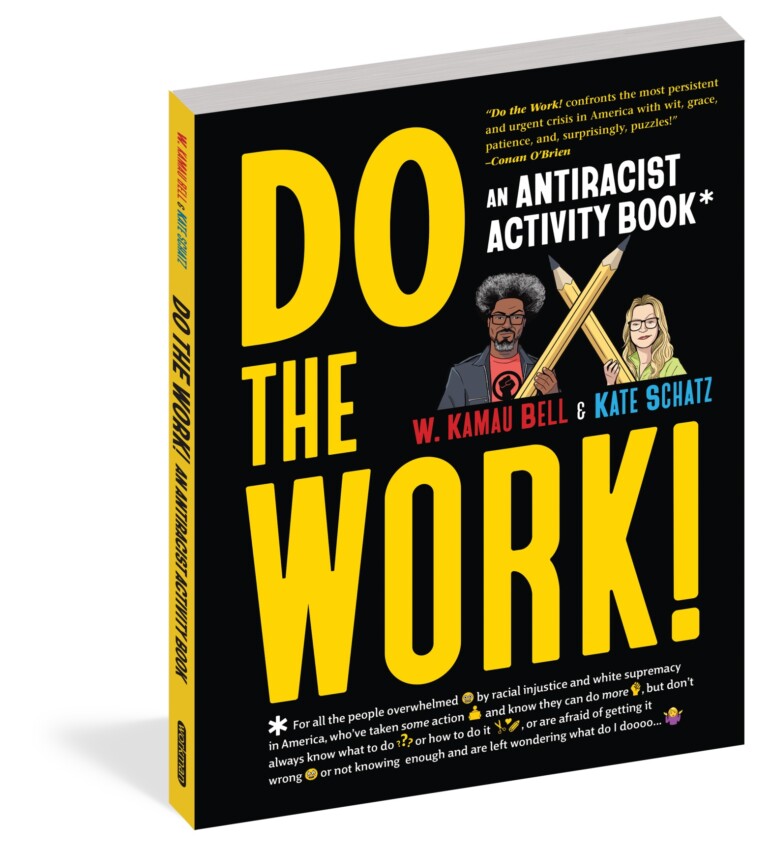If we could say there were high points of 2020, one might be that as a country, the United States admitted it was far from the fever dream of equality. Yet in the two years since, a lack of understanding of race, gender and class have driven bigger wedges between communities of all kinds.
But how does one conquer an enemy like white supremacy that’s embedded in people and intangible systems that dictate society? Reading scholarly books, following organizers on social media, contributing to local organizations and marching in the streets may help. There’s also the internal work of reckoning privileges and navigating a world that uses baseless factors to determine how people get treated and the dangers they face on a daily basis.
As the Bay Area had some of the strictest COVID-19 lockdowns in California, comedian-journalist W. Kamau Bell and activist-feminist author Kate Schatz, both Oakland residents, found themselves with time to ponder that question.
Released in July, their book “Do the Work! An Antiracist Activity Book” (Workman Publishing Co., 176 pages, $22.95) was born out of their talks stemming from the murder of George Floyd and the subsequent surge in activism in mid-2020. While children use workbooks to help learn fundamental skills such as reading, math and science, why not create a workbook to help adults tackle systems of oppression?
“[Bell] reached out to me because so many people, in particular white people, were coming to him asking ‘What do I do?’ We ended up having a series of conversations about all of this,” says Schatz. “We got on our Zoom and we literally each were like, ‘Let’s do an activity book.’ We’re both parents and have young kids, and at the time we were home with them. How do you get third graders to, like, engage with math when they at home? You turn it into a game, you make it into like a some kind of fun activity.”

In ways a syllabus of antiracist history, “Do the Work!” has reading recommendations, breakdowns of systemic issues and prompts to help individuals take a more active role in combating racism in their communities.
There are themed crosswords, a “protest paper doll” and quizzes like “Jim Crow or Jim Faux” to help adults and teens grasp intersectional concepts. Readers can take a literacy test used to prohibit Black voters in the South from exercising their full rights, journal about how their personal histories shape their world views, and even unwind with coloring pages. There are also scripts to help readers make calls to their local politicians and initiate tough conversations with friends and family members who have yet to look inward.
All of “Do the Work!’s” illustrations, activities and visuals were handled by artists of color.
Bell and Schatz use conversational language in the book, which almost feels like a written podcast, as they riff off each other and include personal anecdotes. As a cisgender, straight Black man and queer cisgender white woman, they emphasize that their personal experiences inform the book, but aren’t universal. They admit to their own blind spots and include examples of previous fumbles.
There also are ample pop culture references to get people connecting concepts to real life, laughing along the way. Schatz says that the language of white supremacy, with its emphasis on empirical evidence and a scholarly approach, can alienate people, and thus hinder the work.
“I think we also both felt really strongly about modeling vulnerability, and conversations like this [are] an important part of doing the work. There’s like a socio-emotional component, which is how to talk about it. And how to talk about yourself. The way that we talk about race and racism—especially with the kind of intellectual liberal white way of doing it—we get really intellectual about it, so we get distanced from it. We talk about it as if it’s this kind of intellectual problem that’s somehow separate from us. And we wanted to move on to break through that.”

The book is largely targeted at white Americans, who benefit most from white supremacy in the U.S, but it applies to anyone wanting to create a more equitable society. It primarily deals with how white supremacy has affected Black Americans, even though all races deal with unique barriers to autonomy and respect that deserve deeper inspection and action; that leaves plenty of material for a sequel. Schatz says a new “Do the Work!” is in the works for children.
As the authors reiterate throughout, “Do the Work!” is not a definitive text on antiracism. It’s a pick-up-and-put-down kind of vibe. Schatz says it’s popped up in office waiting rooms, coffee tables and even company bathrooms. It’s just one more step in the lifelong effort we must make in striving for a better society; don’t think that one journaling exercise will save the world.
With the holidays upon us, families and friends with differing worldviews are likely to get tossed into social gatherings where friction is inevitable. But those don’t have to be bad. There’s not one solution to conquering white supremacy, Schatz says. Making a difference will come in many forms.
“The way that I talk about the work…my working definition is that it means that you give a s— about something, that you recognize that injustice exists and that you are willing to do something about it on some kind of regular consistent basis that hopefully requires you to take some kind of risk. That can look incredibly different for each individual person.”
